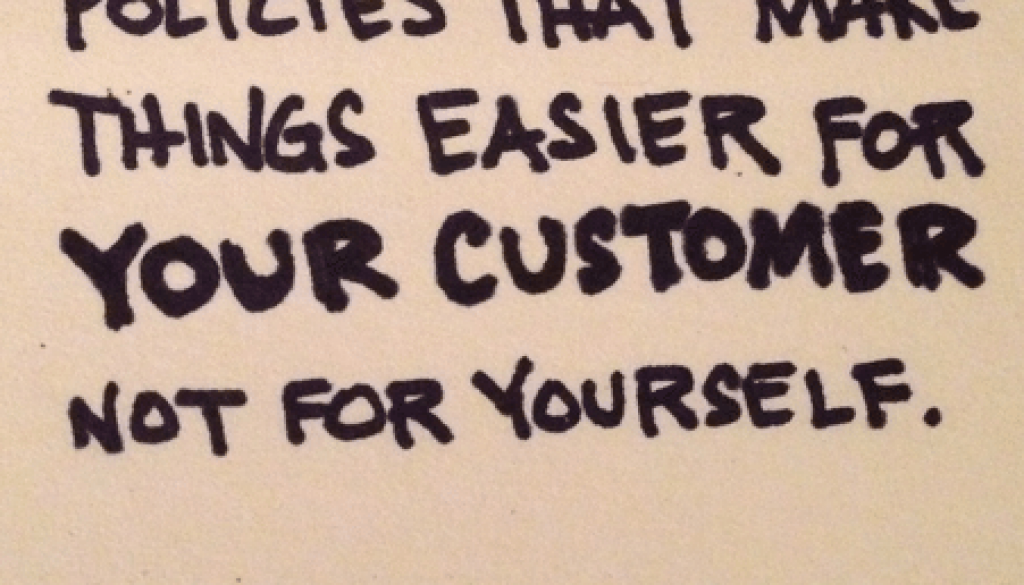Easier For Who?
 When a customer (external or internal) questions a policy or procedure that is foisted upon them by the representative of a company/brand/department with whom they are “trying” to do business, that policy was put in place to make life easier for the company/brand/department — not the customer.
When a customer (external or internal) questions a policy or procedure that is foisted upon them by the representative of a company/brand/department with whom they are “trying” to do business, that policy was put in place to make life easier for the company/brand/department — not the customer.
February is a short month, and March 1 fell on a Sunday, so I tried to pay my March rent via the property manager’s online payment tool (a form which has all sorts of problems, but let’s just stick to this one right now) on February 28, but the web form wouldn’t let me.
You know why?
Neither did I, so I contacted the property manager and was told to try again on March 1st.
You know why?
Because they prefer if tenants don’t pay their rent early — it’s easier on their bookkeeping (#TrueStory #SheActuallySaidThat).
I know what they mean…
I totally hate it when customers pay me EARLY (#NotTrue #PayMeAsEarlyAsYouLike).
This policy wasn’t put in place to make it easy for their customers to do business with this company. It was put in place to make it easier on their bookkeeper.
How about the last time you called your bank?
You have to navigate your way through an endless array of phone prompts asking you to enter everything short of a blood sample, and then what happens (if miracle-of-miracles!) you actually reach a human being?
What’s the the very first thing they ask you to do?
Give them all the exact same numbers and security answers you entered into the phone to even get them on the line in the first place!
Was that policy there to make things easier on you — or them?
What about your company’s policies and procedures?
Is the process there to WOW your customers, make it easy (and fun, and awesome) to do business with you, or is the policy there to eliminate a form you have to fill out, a piece of information you won’t have to look up, to let you sleep in and come into the office an hour later in the morning, or go home an hour earlier in the evening?
Is the policy there to give you weekends off, save you from from answering the phone unless you’re forced to, and put as many hurdles between you and a customer actually getting a hold of you as possible?
If so, the policy is in place to make things easier for you — not your customer.
Think about every single successful “Business 2.0” online, mobile, and app company to have emerged in the last ten years. Every one of those companies made it easier for customers to do business (to spend their money!) with that new company than their previous “business 1.0” counterpart. It wasn’t even close.
- Amazon is open 24/7/365. They remember who you are, what you like to read, and you can buy it with one-click (they OWN “one-click” and proved it in court.) They own “making doing business with them easy.” As referenced in the prior lawsuit link, they won making it one-click easy to do business with them vs. a two-click competitor.
. - Apple made downloading songs from the internet easy. And you didn’t have to buy an entire album (which is what I think really stabbed the record labels in the heart). Not Pandora and Spotify are telling you that you don’t have to download and store anything — you don’t even have to buy.
. - Uber made it easier to take paid car rides. They removed the ridiculous rates and waits (and weird, weird, smells) from the traditional taxi cabs, allowing riders to not only rate their drivers but to pay seamlessly via their phone without having to carry cash or trust their credit card to a stranger.
I suggest you immediately review all of your external AND internal procedures and policies. If those rules are there to make your job easier, rewrite them in favor of the client TODAY.
If not — if you don’t make those changes — you really are making it easier for the client.
Easier to find a reason to switch to a competitor.



